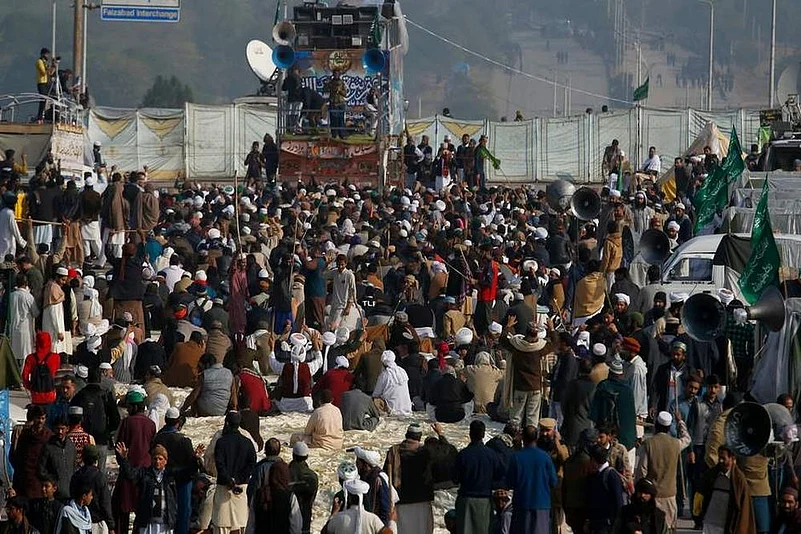Pakistan's hardline religious groups on Monday called off their crippling sit-in in Islamabad and several other cities after law minister Zahid Hamid resigned, meeting one of their key demands to lift the siege.
Hamid's resignation comes in the aftermath of deadly clashes between security forces and protesters during the weekend, that claimed the lives of six people and injured over 100 others.
The sit-in had paralysed the national capital for three weeks.
An official of the Prime Minister House confirmed that the law minister last night sent his resignation to Prime Minister Shahid Khaqan Abbasi, who accepted it.
Hamid's resignation cleared the main hurdle in the lifting of siege of the capital by protesters who demanded his removal for changes in a law related to the Khatm-i-Nabuwwat (finality of prohpethood) oath in the Elections Act 2017.
Advertisement
Activists of Tehreek-i-Khatm-i-Nabuwwat, Tehreek-i-Labaik Ya Rasool Allah (TLY) and Sunni Tehreek Pakistan (ST) religious groups started protests three weeks ago.
Official sources said an understanding was reached with protesters to call off the protest as their key demand had been accepted and the changes made in the law had already been taken back when parliament restored the original oath.
Following the agreement and the subsequent resignation of Hamid, TLY chief Khadim Hussain Rizvi ordered his followers all over the country to end the sit-ins and go home.
"We have decided to end the protest after assurance by the army chief and an agreement with government," he said at Faizabad interchange, where he was camping with over 2,000 supporters for last three weeks.
Advertisement
He said that law minister resigned and government agreed to take action against those who were responsible for making changes in the oath about finality of prophethood.
The right wing cleric, who parlayed life in Islamabad and neighbouring Rawalpindi, said his party was not in favour of violence. He said all of his supporters arrested during crackdown would be released by the government.
He also expressed anger at media for not showing his announcement live and threatened that media persons would not be allowed to leave the venue until his announcement was shown on channels. But he later allowed reporters to go.
Meanwhile, government opened the Islamabad Expressway linking the capital with its only airport and thickly populated suburban areas along the highway. The Murree Road has also been cleared but its link with Club Road is still not operational.
Local channels showed sanitary workers sweeping the roads and cleaning the area of garbage dumped by the protesters.
Radio Pakistan said that Hamid, the minister for law and parliamentary affairs, "voluntarily" presented his resignation to Abbasi to bring the country "out of a state of crisis".
The protesters were demanding Hamid's ouster over his alleged role for changes in the oath about finality of prophethood in the recently passed elections laws.
Advertisement
They had linked the action to blasphemy -- a highly contentious issue in the Muslim-majority Pakistan.
Hamid said in resignation that the Election Act was formulated by a parliamentary committee comprising members belonging to all political parties.
According to the agreement, government would take back all cases against protesters and make public the probe regarding the changes in the oath and also punish those who were responsible for crackdown on protesters.
The agreement lauded efforts of Army Chief General Qamar Javed Bajwa for playing key role in peacefully ending the stand-off, which became possible after an important meeting between Bajwa and Abassi yesterday.
Advertisement
Citing military sources, Dawn reported that the army chief had opposed use of force against its own people since the population's trust in the institution of the army "can't be compromised for little gains".
(PTI)



















